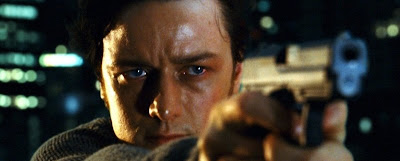
He’s only got two examples so far, and normally you need three to make this sort of pronouncement, but Glenn Kenny says he detects a trend anyway:
- In Jumper, Hayden Christensen plays a guy who can teleport to any place in the world — or at least any place that he can remember being to before — and in one of his voice-overs, he declares: “I wasn’t always like this. Once, I was a normal person. A chump, just like you.”
- In Wanted, which is turning out to have one of the biggest opening weekends of any R-rated film ever, James McAvoy plays a superpowered assassin who can make bullets curve around obstacles to reach their intended targets — and in one of his voice-overs, he declares: “Six weeks ago, I was ordinary and pathetic, just like you.”
The headline that Kenny gives his musings on this trend-in-the-making — “Contempt for the audience!” — brings to mind, for me, recent accusations by a handful of critics that WALL*E, which depicts the human race of the future as a mass of fat and lazy consumers, and which is also doing phenomenal business this weekend, is also “an insult to its customers.”
I have not yet seen WALL*E, so I cannot say whether it merits this criticism or whether it merits being lumped in with these other films — though from what I hear, it at least tries to go someplace redemptive with its satirical set-up. I have, however, seen the other two films, and I think one could point to significant differences between them, too, if one wanted to.
For one thing, the Christensen character makes his statement at the beginning of Jumper, when he is callow and arrogant and unaware of the larger forces that are about to intrude upon his life; he makes his statement, in other words, before the story has given him any opportunity for redemption. (Whether he takes full advantage of that opportunity is another subject for another time.)
The McAvoy character, on the other hand, makes his statement at the end of Wanted, after he has passed through all the training exercises and narrative curveballs that transform him from a wussy office drone to a superpowered hitman. So in his case, the arrogance is something that he seems to earn over the course of his self-actualization, whether you agree with it or not.
This movement towards arrogance on the part of McAvoy’s character is certainly one of the more problematic aspects of Wanted — which is, in many ways, kind of like David Fincher’s Fight Club (1999) but without the clear critique of the characters’ own fascist tendencies. But I actually kind of like this problem.
To bring in another Edward Norton movie, the final moments of Wanted are kind of like the final moments in The Incredible Hulk, inasmuch as they show a character finally taking “control” of his life, but they leave you wondering whether he will use this control to remain a hero or become a villain.
They highlight, in other words, the value of autonomy and self-determination, but also the risks that come with those things. Without free will, we couldn’t be good, not in any meaningful way — but without free will, we also couldn’t sin or do evil. So is the risk of sin and evil worth the free will? That sort of thing.
Do I think we should all try to be more than ordinary in some way? Yeah, absolutely. Do I think extra-ordinary people face the temptation to lord it over the ordinary people, and to think that they are better than they really are? Yeah, absolutely. Do I think McAvoy poses a legitimate challenge to the audience, even if he personally seems to represent something that we should try to avoid in our own lives? Yeah, absolutely.
So a part of me likes that tension at the end of Wanted — even if it seems to lend some validity to McAvoy’s claim that he is no longer “ordinary and pathetic” like the rest of us.
Frankly, if it weren’t for Kenny, I never would have made any sort of connection between this film and Jumper. The film that I was reminded of, at the end of Wanted, was Trainspotting (1996), which famously concludes with Ewan McGregor telling the audience that he’s going to blend in and become a part of society, just like the people he mocked at the beginning of the film, and just like the sorry lot of us sitting right there in the theatre.
Maybe it’s because McAvoy and McGregor are both Scottish, I dunno.












